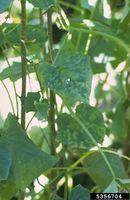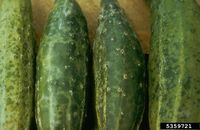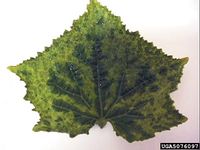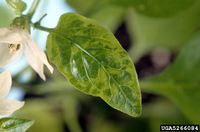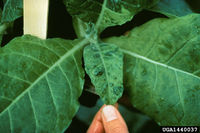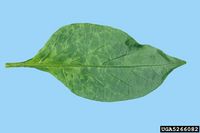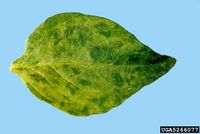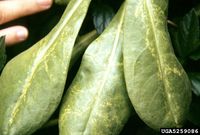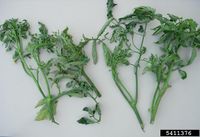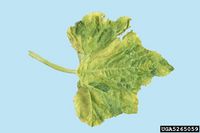Cucumber mosaic virus
| Literature database |
|---|
| 997 articles sorted by: |
| • year (descending) |
| • research topics |
| • countries/regions |
| • host plants |
| • list of antagonists |
Source: Florida Division of Plant Industry Archive - Wikimedia Commons
Cucumber mosaic virus (CMV)
The virus is one of the most important plant viruses, affecting vegetables and many other crops worldwide, mainly in temperate regions. It has a very wide host range and can infect more than 1200 plant species in more than 100 plant families. It often causes significant economic crop losses.
CMV is transmitted by more than 80 aphid species in a non-persistent manner and also mechanically as well as through seeds in some plants. Symptoms vary depending on the host. They include leaf mosaic, mottling, stunting, deformed leaves and roughness of the fruit and leaf surfaces. The virus easily persists in the environment, e.g. in weeds. Management through resistant varieties is the most appropriate method.
| Vernacular names | |
|---|---|
| • Deutsch: | Gurkenmosaik-Virus |
| • English: | Cucumber mosaic virus CMV |
| • Español: | mosaico de las cucurbitáceas |
| • Français: | virus de la mosaïque du concombre |
The virus has a single-stranded, messenger-sense RNA genome containing three segments that are separately encapsidated in isometric particles, each about 29 nm in diameter. The virus strains are divided into three groups (IA, IB and II). CMV is the type member of the genus Cucumovirus.
Synonyms
Soybean stunt virus
For details see the respective page in Wikipedia.
- Other images of Cucumber mosaic virus symptoms (IPM Images - click to enlarge)
